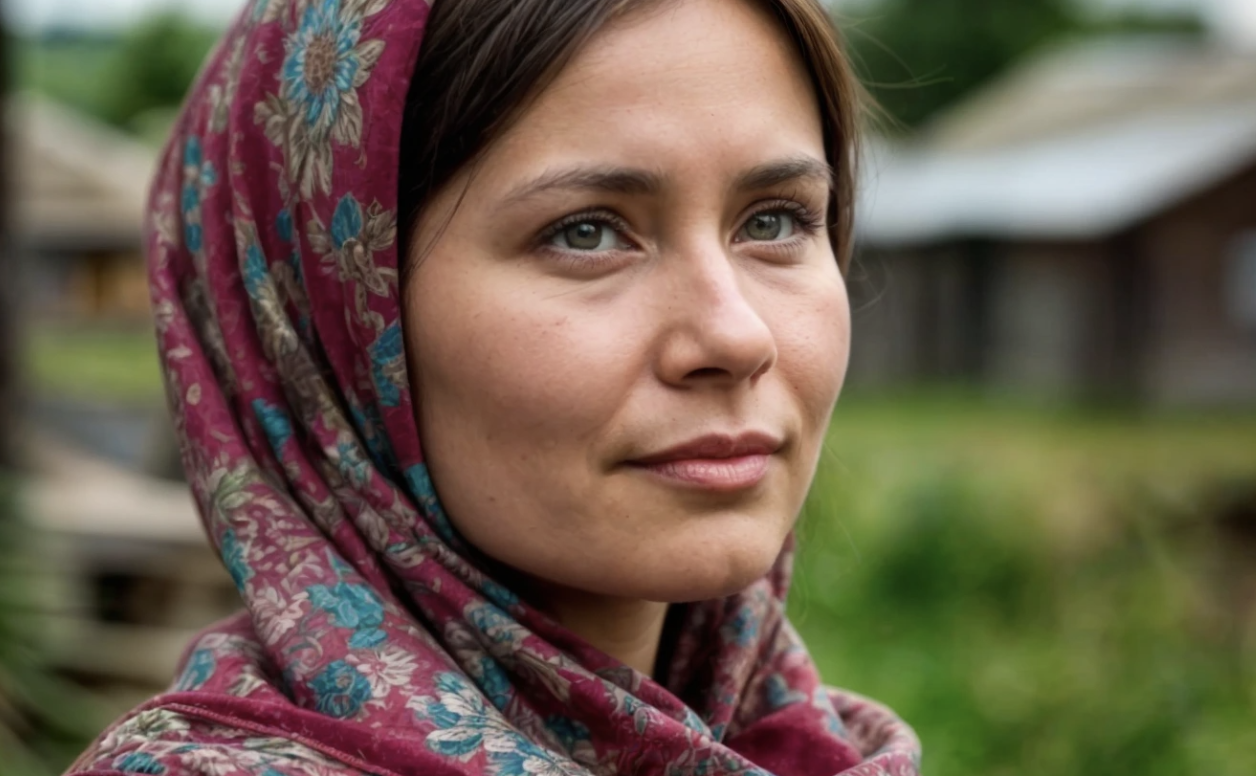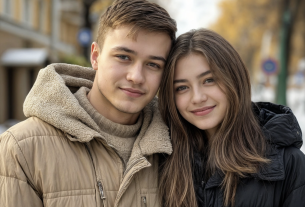An old, crooked house with an overgrown garden, but with a soul. That’s exactly how Alyona saw it in the advertisement. And her heart skipped a beat. The city hustle and bustle had worn her out. Alyona needed a place where time flows slowly, and merging with nature would help heal the torn wounds after her divorce from her husband.
The move felt like an escape. Leaving everything behind, Alyona packed the essentials into the car: a laptop, her favorite mug, a blanket, and, of course, notebooks. The road wound between hills, the sun was setting, and the farther Alyona drove away from the city, the lighter her soul felt.
The first days passed in settling in. The house needed repairs, the garden needed care. But every crack in the wall, every withered rose seemed beautiful to Alyona, full of history. She woke up to the crowing of roosters at the neighbors’. She drank coffee on the veranda, watching the fog dissolve, and felt better with each passing day.
In the city hustle, life felt like that of a trapped animal — walking the same worn path from home to work over and over, reminiscent of the movie “Groundhog Day.”
Alyona had a hard time coping with the breakup from her husband. Completely empty and lost, she wanted to return to life.
By the age of forty, it turned out she could not get pregnant. Tests showed normal results, but doctors shrugged helplessly. Her husband desperately wanted children and, after ten years of marriage without success with Alyona, started dating a younger woman.
Alyona didn’t blame him, understanding that he too had the right to happiness, to continue the family line. But the pain of betrayal, compounded by her own feelings of inadequacy, ate away at her soul. That’s why the old house became her refuge, a remedy for her emotional wounds. She needed a change of environment.
Alyona switched to remote work. She wrote articles for magazines and kept a blog about village life. Gradually, the garden came alive: Alyona planted new flowers, trimmed bushes, cared for the apple trees. The house transformed too: she painted the walls light colors, hung new curtains, and filled the rooms with new furniture bought from a website.
One day, while cleaning out an old shed, Alyona found a box of letters. The yellowed pages were written in beautiful, ornate handwriting. It was correspondence between a young couple. The letters spoke of love, tenderness, and hope for a happy future. Inspired by this couple, Alyona decided to write a novel about two lovers living far apart.
The girl in the letters wrote that after their last meeting with Mikhail, she became pregnant. The lines expressed her anxiety about the future. This letter was never sent, nor were many others. But Mikhail still found out about the pregnancy when he came to visit. This hurt Vera even more because she wanted to live together.
The letters were stacked with dates, and it was clear that the last letters, like a diary or life report, were written by Vera for herself. There was so much pain and suffering in them. Alyona could only guess what might have happened between the lovers. The last letter was written thirty-two years ago, when her son Artyom turned five. Vera wrote that she was planning to move to the city. She described various everyday situations with her son — how he started walking, speaking — how she spent her days, and hoped that Mikhail would come to live with them for good.
“What could have happened? Why didn’t they live together?” Alyona asked herself.
“Maybe Vera’s pregnancy. Or maybe something happened to Mikhail? Or he was married?” There was no answer in the letters. But in her novel, she wanted to give it a happy ending.
According to her calculations, Vera’s son should now be thirty-seven years old.
“How sad that these letters stayed here, unwanted. But it’s a life story,” she thought.
One night Alyona woke up. The branches of the trees were knocking on the windows, and it seemed as if a figure was flickering by the window. But it was just a strong wind lifting everything from the ground near the house — dry branches she had piled for kindling near the gate, leaves rising together with the broom. Then a heavy downpour began.
Alyona felt a little scared. To distract herself, she began to think about Vera’s life. Different thoughts and images came to her mind. She imagined how Vera’s son would read these letters. And maybe meet his father.
“What if?” Alyona suddenly wondered.
A whirlwind of ideas spun in her head. She thought about finding Vera and Artyom. This became her new goal, her personal investigation. She felt she had to return the story of his mother to Artyom. Or give the letters, forgotten by years, back to Vera. And so Alyona began her search. She met neighbors, but many didn’t know Vera because they had moved to the village not long ago. Still, luck smiled on her in a house on a parallel street. Grandma Rita, the homeowner, knew Vera because she was friends with her daughter. Grandma gave her Veronika’s phone number and said that after her daughter got married, she immediately moved to the city.
“I only know one thing: Vera is no longer alive. Veronika told me she went to her funeral,” said Grandma Rita.
“Thank you very much. You helped me a lot,” Alyona thanked her.
She came home inspired. She wanted life to be just as she had imagined in the novel. The son would meet the father. Of course, she hoped Vera was still alive. Alyona wanted to meet her because from the letters it was clear Vera was a very kind woman who hoped to be happy in family life. But fate doesn’t always give what you want. Alyona realized one important thing — when life takes something away, you have to accept it and move on. Then your street will have a celebration too. By living through hardships as lessons, life teaches you to be happy in all situations. To appreciate what you already have. Sometimes it’s hard, and many don’t cope with life’s difficulties, thereby robbing themselves of years of happy life.
For a moment Alyona wondered: why was she doing all this? Maybe Vera didn’t want to tell her son the details. Different thoughts came to her mind. But she listened to her feelings, which told her she was doing the right thing.
Another heavy rain was drumming on the roof. Vera, if she were here, would probably notice how a part of the ceiling was wet, turning into a dark spot. But it didn’t matter — Alyona looked at it but thought about something else. About the upcoming call to Veronika. In her mind she imagined how she must look now. Probably no longer Vera’s young friend, but a woman close to sixty, maybe even a grandmother.
“She must have grandchildren by now,” Alyona thought.
Gathering her thoughts, she dialed the number. The call lasted only a couple of rings — someone answered immediately. The voice on the other end was soft and friendly.
Alyona explained who she was and why she was calling. Told about the letters found in the old shed and asked for Artyom’s address.
“I know where Vera lived. Maybe Artyom lives there with his family now. The last time I saw him was five years ago — at his mother’s mother’s funeral. After that, we didn’t meet,” Veronika replied warmly and with slight sadness.
Alyona sighed with relief. This was the first real step toward completing her plan. Now she had hope — to deliver the letters to Vera’s son. They were not just a story, but a precious memory, a connection between generations.
She decided to go to the city the next day. The main thing was for the rain to stop and for the sun to shine on the road. Fortunately, it happened. The morning was clear, not a cloud in the sky. Sun rays played on the leaves, the air was fresh and brisk. Alyona got into the car with a light heart and drove toward her mission.
The address Veronika gave was close — very near the apartment where Alyona once lived with her ex-husband. The thought caused a slight pain for a moment, but it no longer held her back. Nature, village silence, and the old house helped heal her wounds. And she did not regret buying this place.
After parking near the house where Vera once lived, Alyona went out and saw a young man at the entrance. A flicker of hope: “Could this be Artyom?” She passed by, exchanging a glance with him. He seemed thoughtful, even a bit sad. But she did not stop — went up to the third floor and rang the doorbell. There was no answer.
Disappointed but not giving up, Alyona left a note with her phone number and a short request to get in touch — “I want to talk about Vera.” A minute later, she left the entrance, but the young man was gone. She stood by her car a little longer, looking at the place where he had stood, then drove home.
There she did housework. Picked raspberries and cooked jam using her grandmother’s recipe. While the jam was simmering on the stove, she sat down at the novel. But the ending wouldn’t come — Alyona decided to wait and let the events themselves suggest how it should end.
Pushing the laptop aside, she heard the phone ring. The number was unknown, but Alyona immediately understood — it was him. And she was right.
“I read your note,” came a pleasant male voice. “I’m ready to talk about mom.”
“I have something that belonged to your family,” Alyona said. “Come over.”
They agreed to meet. Artyom promised to come in an hour. Alyona was a little nervous — after all, he once played as a child in this house. Although many years had passed, and he probably didn’t remember anything specific.
When the doorbell rang an hour later, Alyona hurried to open. There was a car at the gate, and at the door — the same young man she saw at the entrance. They both smiled.
“That was you!” Artyom said happily.
“Unexpected,” Alyona replied.
“Looks like we just missed each other,” she added.
The atmosphere between them immediately became light and trusting. Artyom entered the house that once was his mother’s home.
“Strange, but I remember some things,” he said, looking around. “It’s interesting to come back here as an adult. I moved to the city when I was six.”
“Can we switch to informal ‘you’?” he asked. “We’re almost the same age.”
Alyona agreed. She brought a bundle of letters tied with a ribbon. Artyom took them cautiously, as if holding not just paper but a piece of the past. He examined the envelopes, recognized his mother’s handwriting. Tears filled his eyes.
“I didn’t even know they existed,” he whispered, carefully unfolding the first page.
Alyona was silent. She understood this was a personal moment that should not be disturbed. It was a returned piece of life he didn’t even suspect.
After reading a few letters, Artyom looked up.
“My father died when I was six. But my mother never talked about him. It was like she erased him from our lives. I saw him only a couple of times — and that was like in a fog.”
Alyona listened, understanding that maybe the truth was quite different. But she didn’t voice her guesses — not wanting to disturb the fragile peace Artyom had finally found.
After tea, he noticed a wet spot on the ceiling.
“We need to fix the roof,” he said. “Otherwise, it will leak at the next downpour.”
Since then, their meeting was neither the first nor the last. Artyom helped fix the roof, repaired the fence, helped in the garden. And gradually, a bond formed between them, deeper than just gratitude. They talked about everything — the past, the present, dreams. And one day they realized: they met as two kindred souls who, having lost a piece of themselves, found support and warmth.
A year later, they married. And some time after, they had a daughter. They named her Vera — after Artyom’s mother and as a symbol of new life born from old letters found in the shed.


